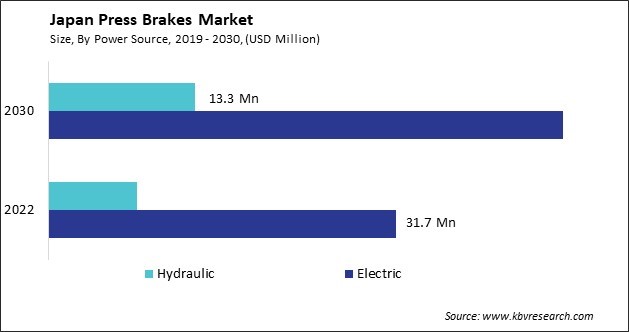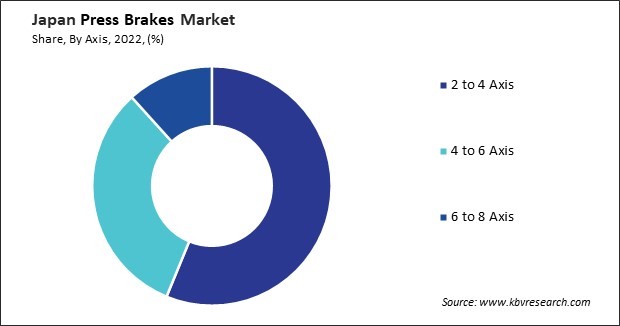The Japan Press Brakes Market size is expected to reach $60.1 Million by 2030, rising at a market growth of 5.4% CAGR during the forecast period.
The press brakes market in Japan is significant within the manufacturing sector. It is characterized by its advanced technological capabilities and stringent quality standards. Japanese manufacturers are renowned for producing high-precision press brakes with cutting-edge features, ensuring accuracy and reliability in metal bending operations. Additionally, these machines often incorporate advanced automation and control systems, enhancing productivity and reducing operational complexities.

The country's robust manufacturing sector is one key factor driving the demand for press brakes in Japan. Japan has long been a global leader in automotive and electronics manufacturing, among other industries, necessitating advanced metalworking equipment like press brakes to meet production requirements. According to the U.S. Geological Survey, in 2019, Japan's nominal gross domestic product (GDP) reached $5.13 trillion, with the manufacturing sector contributing 20.5% of the overall GDP. Moreover, Japan's emphasis on innovation and continuous improvement has led to developing highly efficient and adaptable press brake solutions tailored to diverse manufacturing needs.
The COVID-19 pandemic has had a profound impact on the press brakes market in Japan, as it has on global manufacturing industries. The outbreak led to disruptions in supply chains, temporary closures of manufacturing facilities, and a slowdown in economic activity. However, as the situation stabilized and businesses adapted to the new normal, a renewed focus on resilience and efficiency in manufacturing operations emerged. Press brake manufacturers in Japan responded by offering remote monitoring capabilities, predictive maintenance solutions, and enhanced safety features to address customers' evolving needs amid the pandemic.
The press brakes market in Japan is experiencing a significant shift driven by the increasing demand for electric vehicles (EVs). As the automotive industry transitions towards more sustainable practices, the demand for press brakes, essential equipment in manufacturing, is being reshaped by the growing need for components used in EV production. One of the primary factors fueling this demand is the global push towards reducing carbon emissions and dependence on fossil fuels. Japan, renowned for its technological advancements, is at the forefront of this transition, with both government initiatives and consumer preferences driving the shift toward electric mobility.
Moreover, the evolving landscape of EV technology demands advanced materials and intricate designs, further emphasizing the importance of high-precision manufacturing equipment like press brakes. Manufacturers are investing in state-of-the-art press brake systems equipped with cutting-edge technologies, such as servo-electric drive systems and advanced control interfaces, to meet the intricate demands of EV production. According to the Japan Automobile Dealers Association (JADA), sales of new electric vehicles in 2020 reached close to 1.4 million. The surge in demand for electric vehicles has ripple effects across the entire supply chain, spurring growth in ancillary industries like metal fabrication machinery.
Furthermore, the environmental benefits of electric vehicles extend to the manufacturing process. Electrically powered press brakes offer significant energy savings compared to their hydraulic counterparts, aligning with the sustainability goals of manufacturers and regulatory bodies in Japan. Hence, Japan's increasing demand for press brakes is being reshaped by the transition to electric vehicles, driven by sustainability initiatives and the need for advanced manufacturing technologies to meet EV production requirements.
Japan's press brakes market has witnessed a significant uptick in the adoption of hydraulic press brakes, marking a notable shift in manufacturing preferences and technology usage. Hydraulic press brakes, characterized by their versatility, precision, and efficiency, have emerged as the preferred choice for a wide range of metal fabrication applications in Japan. One of the key drivers behind the rising adoption of hydraulic press brakes is their ability to deliver consistent and high-quality results across various materials and thicknesses.
Another factor contributing to the popularity of hydraulic press brakes is their relatively lower maintenance requirements than their mechanical counterparts. Hydraulic systems are generally simpler in design and experience less wear and tear, reducing downtime and operating costs over the long term. This aspect especially appeals to Japanese manufacturers who prioritize efficiency and productivity in their operations.
Moreover, advancements in hydraulic press brake technology, including integrating features such as automatic tool changers, laser measuring systems, and real-time monitoring capabilities, have further enhanced their appeal in the Japanese industry. These innovations streamline the bending process and improve workflow efficiency and product quality. Thus, Japan's increasing adoption of hydraulic press brakes is driven by their versatility, precision, lower maintenance requirements, and continuous technological advancements, making them the preferred choice for metal fabrication applications.

The press brakes market in Japan is characterized by a diverse range of companies offering innovative solutions to meet the demands of various industries. One of the leading companies in the Japanese press brakes market is Amada Co., Ltd. Founded in 1946, Amada has established itself as a global leader in manufacturing precision machinery and tools, including press brakes. The company's press brakes are known for their reliability, accuracy, and advanced technological features. Amada continuously invests in research and development to improve its product offerings and stay ahead of industry trends. With a strong presence in Japan and a global distribution network, Amada remains a key player in the press brakes market.
Another notable company in the Japanese press brakes market is Komatsu Ltd. Komatsu, renowned for its wide range of industrial machinery and equipment, including press brakes used in metalworking applications. The company's press brakes are valued for their durability, efficiency, and cutting-edge technology. Komatsu focuses on enhancing productivity and reducing environmental impact through innovative manufacturing processes and materials. With a history spanning over a century, Komatsu has built a reputation for delivering high-quality products and excellent customer service in Japan.
Yamazaki Mazak Corporation is also a significant player in the Japanese press brakes market. Specializing in machine tools and systems, Yamazaki Mazak offers a diverse lineup of press brakes tailored to meet various manufacturing needs. The company emphasizes precision engineering and ergonomic design to ensure optimal performance and operator comfort. Yamazaki Mazak's press brakes feature advanced automation capabilities, allowing for increased efficiency and cost-effectiveness in metal fabrication processes. With a focus on continuous improvement and customer satisfaction, Yamazaki Mazak remains a trusted provider of press brakes in Japan.
Additionally, Toyokoki Co., Ltd. is a prominent manufacturer of press brakes in Japan. Established in 1959, Toyokoki has extensive experience producing high-quality bending machines for diverse industrial applications. The company's press brakes are known for their robust construction, user-friendly interfaces, and customizable options. Toyokoki strongly emphasizes innovation and technological advancement, integrating features such as CNC controls and servo-driven systems to optimize performance and accuracy. With a commitment to meet evolving customer needs, Toyokoki continues to expand its presence domestically and internationally in the press brakes market.
Furthermore, companies like Mitsubishi Electric Corporation and Murata Machinery, Ltd. also contribute significantly to the Japanese press brakes market. Mitsubishi Electric offers advanced press brake solutions featuring state-of-the-art servo drive technology and intuitive programming interfaces. Murata Machinery specializes in high-speed, precision press brakes designed for mass-production environments, catering to the automotive, aerospace, and electronics industries. As Japan remains a key hub for manufacturing excellence, these companies are poised to play a crucial role in shaping the future of the press brakes market domestically and globally.
By Power Source
By Axis
By Product Type
Our team of dedicated experts can provide you with attractive expansion opportunities for your business.

